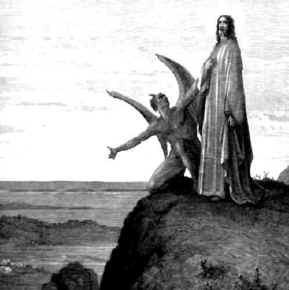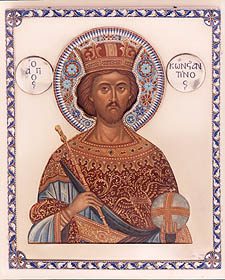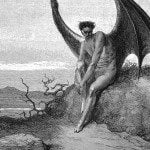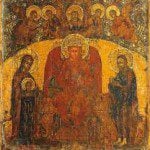“Then the devil took him up to a very high mountain, and showed him all the kingdoms of the world in their  magnificence, and he said to him, ‘All these I shall give to you, if you will prostrate yourself and worship me.’ At this, Jesus said to him, ‘Get away, Satan! It is written: ‘The Lord, your God, shall you worship and him alone shall you serve.'” (Matthew 4: 8-10).
magnificence, and he said to him, ‘All these I shall give to you, if you will prostrate yourself and worship me.’ At this, Jesus said to him, ‘Get away, Satan! It is written: ‘The Lord, your God, shall you worship and him alone shall you serve.'” (Matthew 4: 8-10).
All Christians have something to learn from the latest Vatican scandal. It’s about power.
The Pope’s closest personal assistant has been accused of acquiring and leaking highly sensitive and embarrassing documents to the press. Increasingly, however, mounting evidence, circumstantial at this point, strongly suggests that the butler is a pawn in a larger drama involving high level clergy and Vatican power brokers. It’s another example that the faith did not survive for 2,000 years because of organized religion. Christianity survived in spite of it.
The latest scandal merely adds to the Vatican’s colorful history. Independent of moral missteps like anti-Semitism, paid absolution, or upholding the principle of slavery, the body of Pope Formosus was exhumed and put on trial by another Pope. John XII ran a brothel and drank toasts to Satan. Alexander VI fathered several children by different mistresses. The Borgia Popes professionalized the business of Jesus. Italy’s King declared war on the Papal States in an effort to preserve his country’s unity and independence. The list goes on.
Anglicanism, Lutheranism, and Eastern Orthodoxy, among other Christian denominations have equally colorful stories to tell. The Russian Orthodox Patriarch, reputed to be a billionaire, publicly supports the regime of Syrian dictator Bashar al-Assad who has been universally condemned for butchering his people. In the past, the Orthodox Church collaborated with the notorious KGB, the Soviet secret police. The Ecumenical Patriarch has played politics with Orthodox churches in the former Soviet Union fearing reprisals from the Russian Orthodox Church.
Religious hierarchy has routinely behaved like the Grand Inquisitor in Dostoevsky’s Brothers Karamazov. Who needs Jesus when there is the “Church” and its hierarchy? Fortunately, Jesus Christ transforms and transcends this nonsense. The follies of men are also an ongoing obstacle to the full realization of Christ’s love. Men in suits or miters, bejeweled robes, and ceremonial dresses make bad decisions. Hence, the average parishioner should have a greater say in the matters of their Church.
Despite the many moral and administrative missteps of those in positions of religious authority, people still believe in God. According to a 2011 Gallup Poll, 92% of Americans believe in a higher authority. Yet attendance at most places of worship continues to drop. Spiritual hunger remains and more people are looking for alternatives. If there is “secularism” and “relativism” in the world then Church hierarchy must take responsibility.
The worse thing to happen to Christianity is Emperor Constantine’s adoption of the faith as the official religion.  In the very early church, religious officials were organizers and facilitators. Emperor Constantine elevated them to an undeserved status. Orthodox theologian Fr. Alexander Men observed:
In the very early church, religious officials were organizers and facilitators. Emperor Constantine elevated them to an undeserved status. Orthodox theologian Fr. Alexander Men observed:
“…the Roman empire … recognized Christianity, and even made it the state religion, but in so doing it imperceptibly subordinated Christianity to itself. In many ways, this marked the beginning of a tragic period for the church … when the political authorities pursued their own aims in the name of Christ and of his church. In light of the Gospels, the very ideas of ‘state religion’ or ‘Christian state’ are very doubtful and arguable. Any state, even the most perfect, is nevertheless an instrument of coercion which is difficult to reconcile with the spirit of Christian freedom.”
Although Christianity is not an official state religion today (though Russia might another matter), it still has the baggage of Constantine’s reign that misused the faith. Clergy, especially titled clergy like bishops, archbishops, cardinals, metropolitans, popes, and patriarchs, remain a type of religious royalty today.
In an age when belief in God remains very strong and church attendance continues to drop, the role, power, and influence of hierarchy in all Christian denominations must be evaluated. People need greater control in the management and administration of local parishes and dioceses.
This isn’t to suggest the hierarchy should be completely eliminated. There needs to be an organizational structure. At the same time there must always be the humility to recognize that administrative structures are not Godly, but secular. God does not send representatives to run bureaucracies. Jesus did not seek to replace one power structure with another.
The religious title that someone holds should underscore that they are titles held by men who can be and often are compromised by power. Universally, all Christians should think about, in light of the latest Vatican scandal, how control and power is kept in check and greater spiritual empowerment encouraged among the faithful.











